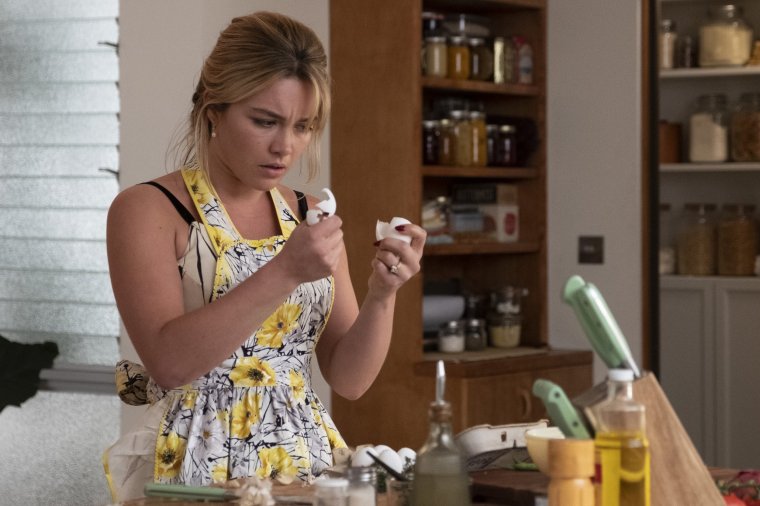Few recent films have courted quite so much controversy as actor-turned-director Olivia Wilde’s hotly anticipated thriller Don’t Worry Darling, which has just premiered at the Venice Film Festival. From rumours about a pay discrepancy between stars Florence Pugh and Harry Styles (which Wilde denies) to a painfully public spat about exactly why Shia LaBeouf left the production, to an apparent falling out between director and star, which lead to Pugh pointedly pulling out of the planned Venice press conference, the film has so far attracted attention for all the wrong reasons.
Unfortunately, the Venice reviews are only likely to add to the film’s list of woes, giving the title a measure of bitter irony in the process. Essentially a case of style(s) over substance, it’s a poorly conceived psychological thriller that starts well, but is ultimately scuppered by a disastrous final act.
Pugh stars as picture-perfect 1950s housewife Alice Chambers, whose British husband Jack (Styles) works for the Victory Corporation, a mysterious organisation whose employees all live and work in a remote desert suburb.

Despite a fulfilling sex life, a seemingly unlimited company credit card and a regular schedule of glamorous parties hosted by Victory boss Frank (Chris Pine) and his even-more-glamorous wife Shelley (Gemma Chan), Alice begins to feel that something about their set-up isn’t quite right. Her concerns are dismissed by both Jack and next-door neighbour Bunny (Wilde). Is Alice cracking up, or is something deeply sinister going on?
The first half of the film is intriguing, creating an aesthetically pleasing world that feels like heightened 1950s pastiche, complete with bright colours and fabulous outfits. Wilde also makes inspired use of a soundtrack composed of incessant 1950s music – at first it’s cheery, carefree and upbeat, but it eventually starts to feel oppressive, like someone trying to force you to have fun.
The performances are good, too. Pugh delivers a compelling, sympathetic turn that’s probably better than the film deserves, while Pine is terrific at suggesting a dark undercurrent beneath his surface charisma – he should definitely play wrong’uns more often. Wilde and Chan are equally good, though the latter is poorly served by the script, in a way that immediately makes you suspect that several of her scenes got cut.
As to the question of whether Harry Styles can actually act, the answer turns out to be yes, he can – at any rate, he acquits himself nicely and has decent chemistry with Pugh, while the script finds a clever way to justify his all-over-the-place accent work (widely mocked after a clip was released online).
The problem is that the third act is an utter disaster. Having spent over 90 minutes priming the audience for a big reveal, the end result feels almost insultingly derivative. Worse, it offers no explanation, wrongly assuming that the flourish itself is enough. Instead, it leaves the distinct impression that something went badly wrong in the editing suite and key explanatory scenes got thrown out along with whatever it was that Gemma Chan’s character was up to.
Ultimately, the film raises far more questions than it answers, and is deeply unsatisfying as a result. That disappointment is further compounded because there’s so much potential in the issues it raises, as if the filmmakers started out with the intention of saying something interesting and important about control, gender roles, gaslighting, toxic relationships and a host of other topics, but then bottled it, hoping that no-one would notice.

